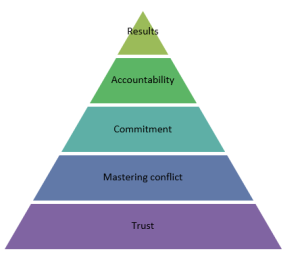Your Team – Dysfunctional or Cohesive?
Last year I had the chance to trial some training materials based on Patrick Lencioni’s book The Five Dysfunctions of a Team – the workshop turns these negative behaviours around to look at what a cohesive team does in order to be effective.
The ideas are common sense and on the surface simple – yet achieving mastery of these five areas is more of a challenge. They are presented in a triangle shape as each is dependent on the other with the foundation behaviour being trust.
Do you recognise any of these?:
Absence of trust
A failure to understand each other and to be open – leading to defensive, political and guarded behaviours.
In a cohesive team, individuals have the confidence that their peers’ intentions are good and are comfortable to open up, ask for help, admit mistakes and have no reason to be protective.
When there is no trust between team members, this leads to a lack of healthy debate or:
Fear of conflict
Ideas and approaches are not challenged, controversial topics are avoided in meetings and there is a failure to tap into the perspectives of all team members.
In a cohesive team, there is productive ‘conflict’ – challenge and debate – in order to find better solutions.
When team members have not had the chance to air their own opinions this leads to lack of buy in to decisions or:
Lack of commitment
There is lack of clarity about direction and priorities leading to delay and over analysis.
In a cohesive team, a decision is better than no decision and individuals buy into the team decision whether they agree with it or not.
With no buy in – team members hesitate to hold each other accountable for their behaviours and actions – there is:
Avoidance of accountability
Team members have different standards of performance and avoid holding each other to account on meeting standards and deadlines.
In a cohesive team there is mutual accountability and poor performance is tackled.
If there is no ‘peer pressure’ to perform and deliver as a team, self interest prevails leading to:
Inattention to team results
Individuals are ego driven to meet their own targets and goals at the expense of the wider team interest.
In a cohesive team reward is based on team results and the focus is on collective goals.
Recommended read: The Five Dusfunctions of a Team – a Leadership Fable by Patrick Lencioni
_______________________________________________________________
Get in touch to find out more about coaching
If you’re interested in developing your self awareness, communication or management skills, confidence, time management or just getting focus on your goals, do get in touch to discuss. I believe everyone has the potential to improve their performance, motivation and happiness – coaching works because you become accountable to an external person who is a source of encouragement and support – as well as challenging your barriers.
Email Zoë Whitby: zoe@zwcoaching.co.uk
Call on: 07919 201128
Like my Facebook page for regular shares of interesting articles and videos click here
Subscribe to my monthly emailer on ‘Effectiveness at Work’ click here
